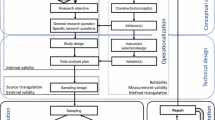Abstract
Ethical values beyond the satisfaction of basic human needs are specific to each society at a given time. Modern societies are confronted to the challenges of disappearing natural resources, fierce competition on global markets, and climate change. In this paper we define ‘good’, and at the same time ‘ethical‘ decisions in the 21st century as being in accordance with the principles of Sustainable Development. Operations Research can assist sustainable decision-making in two ways: (1) through the tools of systems thinking, in particular system dynamics and soft system modelling, to provide insight into the way complex non-linear living systems and human societies function, and help making sustainable decisions, and (2) through educating and training young people in systems thinking. The paper presents examples of simple models that could serve in classrooms.
Similar content being viewed by others
References
Ackoff R (1974) The social responsibility of operational research. Oper Res Q 25:361–371
Apel KO (1990) Is the ethics of the ideal communication community a Utopia? On the relationship between ethics, Utopia, and the critique of Utopia. In: Benhabib S, Dallmayr F (eds) The communicative ethics controversy. MIT Press, Cambridge
Brans JP, Macharis C, Kunsch PL, Chevalier A, Schwaninger M (1998) Combining multicriteria decision aid and system dynamics for the control of socioeconomic processes. An iterative real-time procedure. Eur J Oper Res 109:428–441
Brans JP (2004) The management of the future. Ethics in OR: respect, multicriteria analysis, happiness. Eur J Oper Res 153(2):466–467
Brans JP, Gallo G (2004) Ethics in OR/MS: Past, present and future. 4OR 2:95–110
Checkland P (1993) Systems thinking, systems practice. Wiley, Chichester
Coyle RG (1996) System dynamics modelling. A practical approach. Chapman and Hall, London
de Waal F (2005) Our inner ape. Riverhead Books, New York
Diamond J (2005) Collapse. How societies choose to fail or to survive. Penguin books, London
Dörner D (2004) Die Logik des Misslingens. Strategisches Denken in komplexen Situationen. (The logic of failure—strategic thinking in complex situations). Rowohlt Taschenbuch Verlag, Reinbek bei Hamburg, Germany
Ferry L (1995) The new ecological order, The University of Chicago Press, Chicago, originally published as: Le nouvel ordre écologique. L’arbre, l’animal et l’homme, Grasset, Paris
Forrester JW (1969) Urban dynamics. MIT Press, Cambridge
Girard R (1977) The violence and the sacred. Johns Hopkins University Press Girard, R. originally published as: La Violence et le Sacré, Grasset, Paris, 1972
Habermas J (1990) Discourse ethics: notes on a program of philosophical justification. In: Benhabib S, Dallmayr F (eds) The communicative ethics controversy. MIT Press, Cambridge
Haines SG (2000) Systems thinking and learning. HRD Press, Amherst
Hardin G (1968) The tragedy of the commons. Science 16:1243–1248
Horner P (2002) History in the making, OR/MS today, pp 30–39,
Hosler D, Sabloff JA, Runge D (1977) Simulation model development: a case study of classic Maya collapse. In: Hammond N (eds.) Social process in Maya prehistory. Academic, London
Jackson M (1982) The nature of soft systems thinking: the work of Churchman, Ackoff, and Checkland. J Appl Syst Anal 9:17–27
Jackson M (1985) Social systems theory and practice: the need for a critical approach. Int J Gen Syst 10:135–151
Jackson M (1991) The origins and nature of critical systems thinking. Syst Practice 4:131–149
Kim DH (1992) Systems archetypes, diagnosing systemic issues and designing high-leverage interventions, toolbox reprint series: system archetypes. Pegasus Communications, Cambridge
Kunsch PL (2005) Limits to success. The iron law of Verhulst. In: Ausloos M, Dierickx M (eds.), The Logistic Map and the Route to Chaos, Springer Verlag, pp 29–51
Meadows DH, Meadows DL, Randers J, Behrens III WW (1972) The limits to growth. Universe Books, New York
Mingers J (1980) Towards an appropriate social theory for applied systems thinking: critical theory and soft systems methodology. J Appl Syst Anal 7:41–50
Mingers J (1984) Subjectivism and soft systems methodology—a critique. J Appl Syst Anal 11:85–103
Mingers J (1997) Towards critical pluralism. In: Mingers J, Gill A (eds) Multimethodology: theory and practice of combining management science methodologies. Wiley, Chichester, pp 407–440
Mingers J (2000) What is it to be critical? Teaching a critical approach to management undergraduates. Management Learning 31:219–237
Pearce DW, Turner RK (1990) Economics of natural resources and the Environment. Harvester Wheatsheaf, Hemel Hempstead
Rauschmayer F (2001) How to consider ethics in MCA? In: Colorni A, Parrucini M, Roy B (eds) A-MCD-A, European Commission, JRC, EUR-report 19808 EN, pp 273–279
Richardson GP (ed) (1996) Modelling for management, vol I. Dartmouth Publishing Company, Hants
Richardson LF (1993) The collected papers of Lewis Fry Richardson, vol 2. Quantitative psychology and studies of conflict. In: Sutherland I (ed) Press Syndicate of the University of Cambridge, Cambridge
Roberts N, Andersen D, Deal R, Garet M, Shaffer W (1994) Modeling the ecology of the Kaibab plateau. In: Introduction to computer modeling, chap 18. Productivity Press, Portland
Rosenhead J (1989) Operational research at the crossroads: Cecil Gordon and the development of post-war OR”. J Oper Res Soc 40:3–28
Schweitzer A (1996) Kultur und Ethik, reprint of an original work published in 1923, Verlag C.H. Beck, München
Senge PM (1990) The fifth discipline. The art and practice of the learning organization. Doubleday & Co., New York
Sterman JD (2000) Business dynamics, systems thinking and modeling for a complex world. McGraw-Hill, Boston
Stevenson GG (1991) Common property economics. Cambridge University Press, Cambridge
VENSIM (1998–2003) Professional32 Version 5.4.a. The Ventana simulation environment. Ventana Systems, Inc.©
Vinolo S (2005) Du Mimetismeà l’homonisation “La violence différante”. L’Harmattan, Paris
Wallace WA (1994) Ethics in modeling. Pergamon, New York
World Commission on Environment and Development (WCED). Our common future. Oxford University Press, Oxford, p 43 (1987)
Author information
Authors and Affiliations
Corresponding author
Rights and permissions
About this article
Cite this article
Kunsch, P.L., Theys, M. & Brans, J.P. The importance of systems thinking in ethical and sustainable decision-making. cent.eur.j.oper.res. 15, 253–269 (2007). https://doi.org/10.1007/s10100-007-0029-8
Accepted:
Published:
Issue Date:
DOI: https://doi.org/10.1007/s10100-007-0029-8



